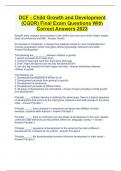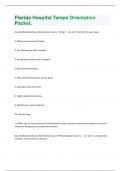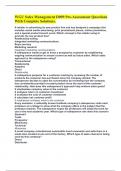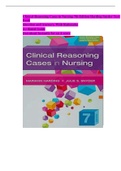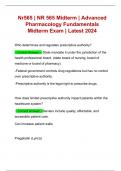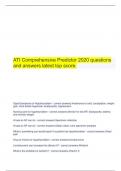DCF - Child Growth and Development
(CGDR) Final Exam Questions With
Correct Answers 2023
Specific body changes and increases in the child's size such as a child's height, weight, head circumference and BMI - Answer Growth
An increase in complexity, a change from relatively simple to more complicated and involves progression where child gains refined knowledge, behaviors and skills. - Answer Development
The following are _________ between children in growth:
1. growth proceeds from head down
2. control of head and neck first, then arms, then legs
3. brain, heart and spinal cord are fully functional at birth
4. arm and leg muscles first then fingers and toes - Answer Similarities between children in growth
The following are _____________:
1. Developmental sequence is similar for all
2. Development proceeds from general to specific
3. Development is continuous
4. Development proceeds at different rates
5. All areas of development are interrelated - Answer 5 basic principles of child growth and development
Principle ____: children develop in relatively the same ways, there is a typical sequence
of development that occurs as the child grows, behaviors and skills emerge in the same order - Answer Principle 1
Principle _____: body changes in a sequence and gives new abilities; as brain develops, cognitive skills improve - Answer Principle 2
Principle _____: there is continuity from one phase of development to the next, children continue to add behaviors as they perfect others (ex: language; cooing --> words) - Answer Principle 3
Principle _____: sequence of development is the same but the rate is different, development is constant but not uniform - Answer Principle 4
Principle _____: the developmental domains influence development in other areas. - Answer Principle 5 A set of ideas of facts principles analyzed in relation to one another and used to explain a phenomena. - Answer Theory
Who came up with the following and what is it called?
1. Physical (food)
2. Security (stability)
3. Belonging (social, love, acceptance)
4. Esteem Needs (importance)
5. Self-Actualization (empathy) - Answer What are the 5 levels of Maslow's Hierarchy?
What does Maslow's Hierarchy mean to child care professionals? - Answer Basic needs
must be met first, if not, self-worth suffers. Awareness of family circumstances can help caregivers know what needs are or are not being met.
Who came up with the following and what is it called?
There are 8 total first 4 deal with birth - 12 (where children develop ability to learn) Emotional development is a serious of conflicts that must be resolved before proceeding to the next. Moving through the conflicts successfully ensures social and emotional stability - Answer Erik Erikson Conflicts in emotional development
What are the first 4 stages of conflict and what age range do they correspond to? - Answer Trust v. Mistrust- Infant
Autonomy v. Shame and Doubt- Toddler
Initiative v. Guilt- Preschool
Industry v. Inferiority- Grade School
What do Erik Eriksons' conflicts mean to child care professionals? - Answer Create relationships with children that are built on trust, allow children to exercise autonomy, promote creativity
Who came up with the following and what is it called?
1. Sensorimotor 0-2: learning through sensory perception and motor skills
2. Preoperational 2-7: uses symbols, bound by what they experience directly and not by what they think
3. Concrete-Operational 7-11: rational thinking 4. Formal Operations 11 +: final stages of cognitive development, abstract thinking, think beyond present. - Answer Jean Piaget Four Stages of Cognitive Development
(CGDR) Final Exam Questions With
Correct Answers 2023
Specific body changes and increases in the child's size such as a child's height, weight, head circumference and BMI - Answer Growth
An increase in complexity, a change from relatively simple to more complicated and involves progression where child gains refined knowledge, behaviors and skills. - Answer Development
The following are _________ between children in growth:
1. growth proceeds from head down
2. control of head and neck first, then arms, then legs
3. brain, heart and spinal cord are fully functional at birth
4. arm and leg muscles first then fingers and toes - Answer Similarities between children in growth
The following are _____________:
1. Developmental sequence is similar for all
2. Development proceeds from general to specific
3. Development is continuous
4. Development proceeds at different rates
5. All areas of development are interrelated - Answer 5 basic principles of child growth and development
Principle ____: children develop in relatively the same ways, there is a typical sequence
of development that occurs as the child grows, behaviors and skills emerge in the same order - Answer Principle 1
Principle _____: body changes in a sequence and gives new abilities; as brain develops, cognitive skills improve - Answer Principle 2
Principle _____: there is continuity from one phase of development to the next, children continue to add behaviors as they perfect others (ex: language; cooing --> words) - Answer Principle 3
Principle _____: sequence of development is the same but the rate is different, development is constant but not uniform - Answer Principle 4
Principle _____: the developmental domains influence development in other areas. - Answer Principle 5 A set of ideas of facts principles analyzed in relation to one another and used to explain a phenomena. - Answer Theory
Who came up with the following and what is it called?
1. Physical (food)
2. Security (stability)
3. Belonging (social, love, acceptance)
4. Esteem Needs (importance)
5. Self-Actualization (empathy) - Answer What are the 5 levels of Maslow's Hierarchy?
What does Maslow's Hierarchy mean to child care professionals? - Answer Basic needs
must be met first, if not, self-worth suffers. Awareness of family circumstances can help caregivers know what needs are or are not being met.
Who came up with the following and what is it called?
There are 8 total first 4 deal with birth - 12 (where children develop ability to learn) Emotional development is a serious of conflicts that must be resolved before proceeding to the next. Moving through the conflicts successfully ensures social and emotional stability - Answer Erik Erikson Conflicts in emotional development
What are the first 4 stages of conflict and what age range do they correspond to? - Answer Trust v. Mistrust- Infant
Autonomy v. Shame and Doubt- Toddler
Initiative v. Guilt- Preschool
Industry v. Inferiority- Grade School
What do Erik Eriksons' conflicts mean to child care professionals? - Answer Create relationships with children that are built on trust, allow children to exercise autonomy, promote creativity
Who came up with the following and what is it called?
1. Sensorimotor 0-2: learning through sensory perception and motor skills
2. Preoperational 2-7: uses symbols, bound by what they experience directly and not by what they think
3. Concrete-Operational 7-11: rational thinking 4. Formal Operations 11 +: final stages of cognitive development, abstract thinking, think beyond present. - Answer Jean Piaget Four Stages of Cognitive Development

